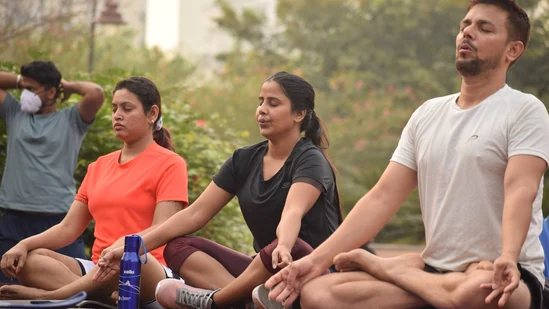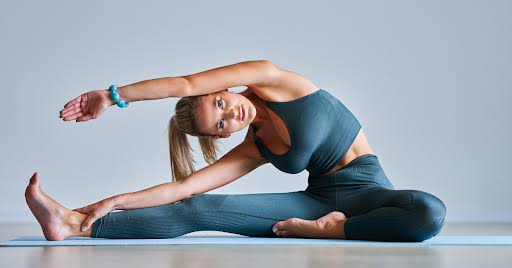
Walking, biking, swimming, yoga, and core exercises can help improve digestion and increase stamina.
Digestion
- WalkingBrisk walking stimulates your digestive system, which can help with bloating and gas.
- BikingThe quick movements of biking can help move food through your digestive system.
- SwimmingLow-impact swimming can help relieve stress and stimulate your abdominal muscles.
- YogaYoga can help reduce stress, which can improve your digestive system. Some yoga poses that can help with digestion include downward dog, boat, child’s pose, upward dog, and triangle.
- Running: Running can help get your body moving, including your bowels. It also increases blood flow, which can support your digestive tract muscles.
- Strength training: Strength training can help you build stamina.
- Cardio: Cardio exercises like running and cycling can help build stamina.
Other exercises
- Sit-ups or crunches can help boost your digestive health.
- Pelvic floor activation can help with digestion.
- Dancing can help improve your mood and get you more active.
- Team sports like basketball and soccer can help you get more active and social.
Iron and B vitamins are crucial for stamina. Iron transports oxygen, while B vitamins aid energy production and red blood cell formation. Consume iron-rich foods (meat, beans) and B vitamin sources (meat, dairy, whole grains). Consult a doctor before supplementing. A balanced diet is key. Sources and related content.
Introduction
Stamina, the ability to sustain physical or mental exertion over a prolonged period, is crucial for overall health and performance. While a balanced diet and regular exercise are fundamental for building stamina, specific nutrients play a vital role in optimizing energy production and reducing fatigue. Among these, iron and B vitamins stand out as essential players in boosting stamina naturally. This article explores the specific roles of these nutrients and how they contribute to enhanced endurance.
Understanding the Connection
Iron and B vitamins are involved in critical metabolic processes that directly impact energy levels and stamina. They are essential for:
- Oxygen Transport: Iron is a key component of hemoglobin, the protein in red blood cells that carries oxygen throughout the body. Adequate iron levels are crucial for delivering oxygen to muscles, which is essential for energy production.
- Energy Production: B vitamins play a crucial role in converting food into energy. They are involved in various enzymatic reactions that break down carbohydrates, fats, and proteins, releasing the energy needed for physical and mental activities.
- Red Blood Cell Production: Both iron and certain B
- B vitamins (especially B12 and folate) are necessary for the production of red blood cells. A sufficient number of healthy red blood cells ensures adequate oxygen delivery, preventing fatigue and boosting stamina.
- The Role of Iron in Stamina
- Iron deficiency is a common cause of fatigue and reduced stamina. Symptoms of iron deficiency can include:
- Fatigue and weakness
- Shortness of breath
- Pale skin
- Dizziness
- Reduced exercise capacity
- Ensuring adequate iron intake is crucial for maintaining optimal energy levels and supporting stamina. Good sources of iron include:
- Red meat
- Poultry
- Fish
- Beans and lentils
- Spinach
- Fortified cereals
- The Role of B Vitamins in Stamina
- B vitamins are a group of essential nutrients that play diverse roles in energy metabolism and overall health. Key B vitamins for stamina include:
- Vitamin B12: Essential for red blood cell formation and neurological function. Deficiency can lead to fatigue, weakness, and cognitive issues.
- Folate (Vitamin B9): Also crucial for red blood cell production and DNA synthesis. Deficiency can cause fatigue and weakness.
- Vitamin B6: Involved in energy metabolism and neurotransmitter production.
- Other B Vitamins: Other B vitamins, such as thiamin (B1), riboflavin (B2), and niacin (B3), also play important roles in energy production and overall health.
- Good sources of B vitamins include:
- Meat
- Poultry
- Fish
- Eggs
- Dairy products
- Whole grains
- Legumes
- Leafy green vegetables
- Optimizing Iron and B Vitamin Intake
- To ensure adequate intake of iron and B vitamins for boosting stamina:
- Eat a Balanced Diet: Consume a variety of nutrient-rich foods from all food groups.
- Include Iron-Rich Foods: Prioritize iron-rich sources like red meat, poultry, fish, beans, and fortified cereals.
- Consume B Vitamin-Rich Foods: Include meat, poultry, fish, eggs, dairy, whole grains, and leafy green vegetables in your diet.
- Consider Supplementation (if necessary): If you suspect you may be deficient in iron or B vitamins, consult with your doctor or a registered dietitian before taking supplements. They can assess your individual needs and recommend appropriate supplementation if necessary. It is important to note that unnecessary iron supplementation can be harmful.
- Address Underlying Conditions: If you experience persistent fatigue or low stamina, consult with your doctor to rule out any underlying medical conditions that may be contributing to these symptoms.
- Conclusion
- Iron and B vitamins play critical roles in energy production, oxygen transport, and red blood cell formation, all of which are essential for boosting stamina. By ensuring adequate intake of these nutrients through a balanced diet and addressing any potential deficiencies, you can optimize your energy levels, reduce fatigue, and enhance your physical and mental endurance. Consulting with a healthcare professional can help personalize dietary recommendations and determine if supplementation is necessary.
- Q&A Section
- Q1:- Why is exercise important for digestion?
- Ans:- Exercise helps stimulate bowel movements, reduces bloating, and improves gut motility by enhancing blood flow to the digestive system.
- Q2:- How does physical activity help in increasing stamina?
- Ans:- Regular exercise strengthens the heart, lungs, and muscles, improving endurance and allowing the body to sustain physical activity for longer periods.
- Q3:- What is the best exercise for improving digestion?
- Ans:- Walking is one of the best exercises for digestion as it helps stimulate intestinal contractions and prevents bloating and constipation.
- Q4:- How long should you walk after a meal for better digestion?
- Ans:- A 10–15 minute walk after meals can help improve digestion and regulate blood sugar levels.
- Q5:- Can yoga help with digestion?
- Ans:- Deep breathing reduces stress, which is a major cause of digestive issues, and helps stimulate the vagus nerve, promoting gut health.
- Q8:- What type of cardio exercise is best for digestion?
- Ans:- Light to moderate cardio exercises like jogging, cycling, and swimming enhance blood circulation, aiding digestion and reducing bloating.
- Q9:- How does strength training improve digestion?
- Ans:- Strength training helps build core muscles, which support better posture and digestion while also enhancing metabolism.
- Q10:- Can stretching exercises help with digestion?
- Ans:- Yes, stretching improves circulation and relaxes the digestive organs, reducing bloating and discomfort.
- Q11:- How does running impact digestion and stamina?
- Ans:- Running boosts metabolism, enhances gut motility, and increases cardiovascular endurance, improving both digestion and stamina.
- Q12:- Can high-intensity workouts benefit digestion?
- Ans:- Yes, but they should be done in moderation. Intense workouts improve circulation and metabolism but can cause digestive discomfort if done immediately after eating.
- Q13:- How does swimming help with digestion?
- Ans:- Swimming promotes blood flow to the digestive system, reduces stress, and helps with overall gut function.
- Q14:- Why is hydration important for digestion and stamina?
- Ans:- Staying hydrated aids digestion by softening stool and preventing constipation, while also helping muscles function properly during exercise.
- Q15:- What are the benefits of cycling for digestion?
- Ans:- Cycling improves gut motility, enhances circulation, and reduces bloating, making it a great exercise for digestion.
- Q16:- How does skipping (jump rope) help digestion and stamina?
- Ans:- Skipping improves heart rate and blood flow, which enhances digestion while also building endurance and stamina.
- Q17:- Is Pilates good for digestion?
- Ans:- Yes, Pilates strengthens core muscles, improves posture, and enhances gut function, aiding digestion.
- Q18:- How do abdominal exercises improve digestion?
- Ans:- Core workouts like planks and crunches strengthen abdominal muscles, supporting better digestion and reducing bloating.
- Q19:- What is the role of meditation in digestion and stamina?
- Ans:- Meditation reduces stress, which can cause digestive problems, and also improves focus and mental stamina.
- Q20:- How often should you exercise to improve digestion and stamina?
